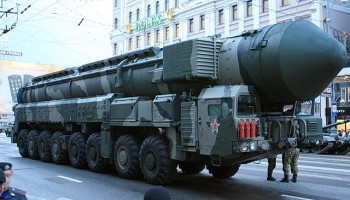That is not an idle threat here, where in 2003 mobsters assassinated the first democratically elected prime minister.
Security recently was tightened for President Boris Tadić, Minister of Justice Snežana Malović and organized crime prosecutor Miljko Radosavljević. Security services uncovered several planning missions in which mobsters had wired the homes of elected officials and tracked their associates and friends to learn their daily routines.
“When the government begins to seriously attack organized crime, it leads to direct response (from the crime gangs). Therefore, I believe that these threats are a sign that something is changing in Serbia,” Professor Aleksandar Fatić of the Center for Security Studies, a non-profit organization that examines the impact of crime on Serbia’s economy and society. told the Center for Investigative Reporting in Serbia.
The threats haven’t slowed down an aggressive government campaign against the mobsters. According to the Department of Management of Temporarily Seized and Confiscated Assets, items seized by the courts over the past year include 20 houses, 33 apartments, nine automobiles, two hotels, four restaurants and more than €800,000. Officials said hundreds of smaller items, including televisions and electronics, were also seized.
(See accompanying story for complete list)
“Provided that all the temporarily seized items are going to be taken away permanently by a court decision, and including movable property, I predict that the value of the seized assets is going to be around €200 million,” said Slobodan Homen, state secretary in the Ministry of Justice.
Accused drug dealer Darko Šarić and some public figures have already seen the power of the new law. The department seized from Šarić land the size of three football fields. When Branislav Uskoković, ex-manager of the public company for electricity distribution, Electricity Belgrade, was arrested and charged with misusing his official position, officials seized five apartments, five houses (two of them had attached businesses) and three buildings.
In January the prosecutor’s office put on a display in front of the Special Court for Organized Crime, showing 20 temporarily seized cars, including a Porsche SUV that belonged to accused heroin dealer Suvad Musić. It is worth an estimated €100,000.
Asset seizures are only one method Serbian officials are using. The country’s law enforcement officers are better cooperating with other countries to track and arrest criminal groups. The cooperation even extends to former foes from the Yugoslavian wars of the early 1990s.
Although tensions have not disappeared, Serbian and Croatian police worked successfully in the case of the assassination of Croatian journalist Ivo Pukanić. Police have arrested and charged Sreten Jocić, also known as Joca Amsterdam, for organizing the murder. Prosecutors also convicted Jocić for arranging the murder of Belgrade criminal Goran Marjanović, known as Goksi Bombaš. In June, Jocić was sentenced to 15 years for that murder.
International cooperation also proved to be good in the case of the Darko Šarić group. The Serbian Security Information Agency announced Oct. 15 that in cooperation with the American Drug Enforcement Administration, Uruguay and Argentine police had seized more than two tons of pure cocaine in Uruguay. Šarić, until then little-known, is now believed by police to be an important link in the chain of drug trafficking in the Balkans. Charges were brought against members of Šarić’s gang, but he remains a fugitive. The case has caused tension between Serbia and Montenegro, making it more difficult to arrest him. Both countries have fled from responsibility.
“You can’t expect good cooperation and maintain brotherly relations with a state you also call criminal,” Professor Fatić said about Serbia. “Serbia must throw off the illusion that she has some hegemony over the Balkans and that she can lecture other countries.’’
Serbia still has much work to do clearing its own government of corruption. Law enforcement officials said most of the largest drug groups could not operate without inside help. Police believe, for example, that Šarić has laundered drug money through privatization by purchasing companies and real estate in Serbia and Montenegro. Even the Serbian Ministry of Interior (MUP) twice issued permits to the security firm “Total Security System” which is connected to Šarić. The permit allowed his gang to procure and possess eight guns.
But officials promise some public servants will be arrested.
“The Prosecutor's Office will complete this part of the investigation in August and you can count on it that many more people will be arrested for money laundering and corruption. And some of them will be former state officials,’’ Homen, the state secretary, said.
There are other signs that more work needs to be done. While asset seizures are up, the quantity of drugs being confiscated has fallen drastically in recent years.
Heroin is the most popular drug in Serbia, especially among the poor, primarily because it is cheap. According to the UN Office on Drugs and Crime, roughly 80 tons of heroin pass through the Balkans each year. But, in 2009, Serbian police seized only 135 kilograms of that. That amount is less than half of what was seized a year earlier and four times less than in 2007.
Until Serbian police can arrest the highest-ranking drug dealers, little will change for the average citizen.
“If we talk about Serbia and protection of our youth, I think that biggest problem is heroin, said Homen, who advocates more action in small towns even if it doesn’t yield large amounts of illegal drugs. One of the largest recent police actions, named Morava after a river in Serbia, was aimed at local dealers and resulted in more than 500 arrests.
But that is not enough, others warn.
“Dealers are easy to replace and the price of heroin is still low,’’ said Lazar Janković, deputy head of service for Combating Organized Crime (SBPOK). “Morava has been effective on the dealer level. Now, it is up to the police administrations to develop this vertically up to serious players.’’
-- Vladimir Kostic





